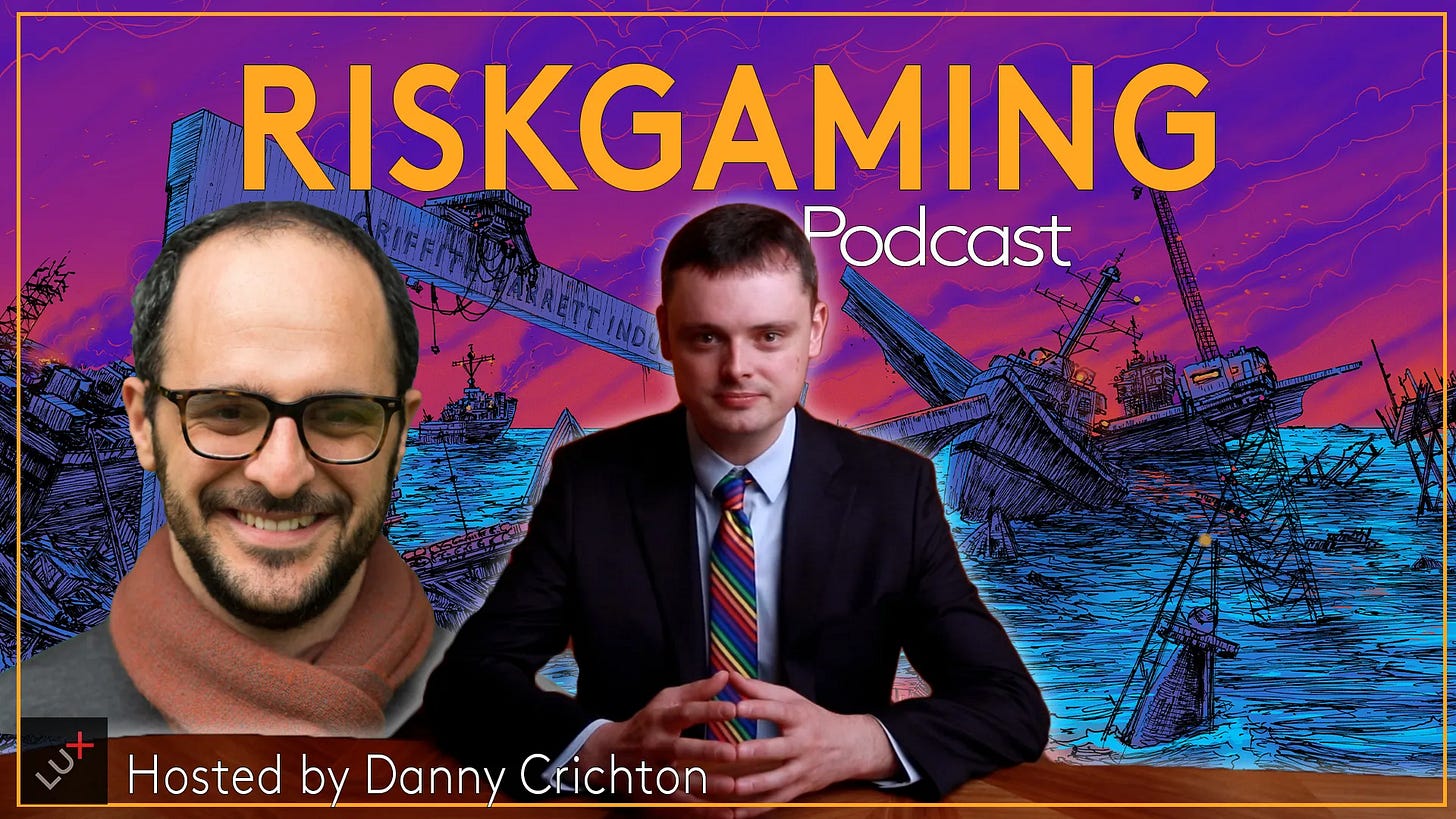Everyone loves a good Renaissance man or woman, but it’s hard to do it all with tenacity and verve. There’s also the constant balance between perfectionism and dilettantism — how long should you keep refining a project versus just bringing it to a close? For those of us prone to procrastination, even asking that question might prompt a delay.
That’s why I am excited to bring my good friend Uri Bram on the podcast this week. He’s written a book on Bayes’ theory, has been a publisher of a very successful online newsletter, has hosted olfactory gallery parties, and he just published his first party game called Person Do Thing inspired by trying to order vegan food at a restaurant in Thailand. In short, he’s constantly experimenting with new forms of media and ways to bring people together.
In this episode, we talk about Person Do Thing; communications and the curse of knowledge problems; Amazon recommendations as a social networking tool; and his recent viral blog post, “21 Facts About Throwing Good Parties.”
This interview has been edited for length and clarity. For the full conversation, please subscribe to our podcast.
Danny Crichton:
Uri you are the Dos Equis man of events. You’ve been hosting meetups all around town, you’ve run a publication, you wrote a book, and you’ve joined a lot of our Riskgaming experiences. And now you just launched a new game called Person Do Thing. So when did you start thinking about the game?
Uri Bram:
Person Do Thing started out when I was in Thailand 10 years ago. I was at a cafe and trying to explain that I’m vegetarian despite not speaking any Thai. I was there with a friend who spoke a very small amount of Thai. So we were kind of talking to this waitress, and we’re saying, “No beef, no chicken, no pork.” And there was this moment where you could see in her face she understood. She was like, oh, these people are trying to tell me they want food with no meat in it.
And so we started this conversation about what’s the smallest set of words you could use to describe every other concept? The game is essentially that you have 34 very simple words you’re allowed to use, like “person” and “do” and “thing.” You are given a card, a word you’re trying to describe, and then you try and describe it using only these simple words. So you sound very stupid, but it does, I think, have quite a lot of philosophical depth.
Danny Crichton:
And what do you think that depth is?
The best way to get an idea into someone else’s head is often not trying to directly and abstractly describe it, but to tell them a story, to narrativize it.
Uri Bram:
The game embodies the curse of knowledge problems. You often see people playing badly because they know what the answer is, and the description they’re giving does fit the answer, but the description also fits many other things, and they just can’t understand why the guessers are not on the right track. I think that’s very interesting.
The best way to get an idea into someone else’s head is often not trying to directly and abstractly describe it, but to tell them a story, to narrativize it and kind of draw them along a path. I’m obviously talking my own book here, but I think this game can help you communicate better and think better about other people in a way that’s incredibly interesting and just very fun.
Danny Crichton:
That’s a theme across a lot of your work.
Uri Bram:
Yeah. You know what people say about good in software and good in hardware? Some people are born with natural empathy and the ability to read other people’s minds. Anyone who went to high school with me would say I lacked those abilities as a teenager. And so I spent a lot of my life trying to figure out how to communicate, and thinking about it and practicing it. And I feel like a lot of my projects, you’re right, do tend to bring that together.
Danny Crichton:
Your book is literally called Thinking Statistically.
Uri Bram:
Yes. I wrote this book just after college. I had a really beloved professor in undergrad who I asked one day, “How many of the undergrads here do you think know about Bayes’ theorem?” And he said, “A hundred percent. Everyone knows about Bayes theorem.” And then he kind of stopped and reflected and said, “Maybe not the music majors. So let’s just say 99%.” And I thought, you’re very ill-calibrated here.
I loved this professor, but I thought the interaction explained why so many of the stats classes — the intro stats classes — will just tell you how to calculate a standard deviation. I actually think there’s this separate set of conceptual tools that all statisticians and econometricians have, but it seemed to me that no one was trying to explain them directly. So I wrote this very short book, which tried in a relatively light, fun way to explain those concepts.
Danny Crichton:
You keep going back to this pattern — you’re in Thailand 10 years ago, you wrote this as a post-undergrad. It’s all about trying to upgrade people’s thinking and cognitive capabilities.
Uri Bram:
Interesting. I was not expecting Riskgaming to be a therapy session, but this is working very well.
Danny Crichton:
You also hosted this event, Museum of Scent. Explain that a little bit.
Uri Bram:
Yeah, there’s an amazing gallery here in Manhattan called Olfactory Art Keller, which basically stakes the claim that most art is visual, so why can’t we have art for the other senses? So this gallery is a series of bottles you sniff, and I organized a number of events getting people to come. We had a little quiz, where he would give you a bottle that represented a country or a musician or something and you had to guess what it was. I found that very fascinating.
I also came to an amazing scent event that you hosted, right? With Osmo.
Danny Crichton:
With Osmo, yeah.
They’re inventing new scents all the time now, and scents that no one’s ever smelled before, which is the fun part. Obviously, we always had existing ingredients that you mix, but now that we have the 3D modeling for smell, you’re actually able to go in the inverse direction and say, okay, what is something that we predict you will perceive as a certain scent, but no one in the world has ever smelled before? And so they now have multiple of these.
Uri Bram:
I mean, this is incredible. It’s hard to explain in audio, but this feeling of being on the frontier — I think it just opens up space. Most people, once they are doing something that has been done many times previously, will naturally fall into the same patterns, the same rules. I often feel this with nonfiction books, there’s a format that most nonfiction books fall into. But if you’re in some new open land that has never been explored, you can suddenly make all the decisions yourself.
Most of the progress in the world comes from disagreeable people. You kind of have to buck consensus and be willing to say something and have people disagree with you.
Danny Crichton:
One of the challenges I have is that, when you have a new thesis, it takes time to persuade. It’s not enough to just expose people to a new idea because, oftentimes, they’ll reject it immediately. So you have to do it slowly. It is the same with games. The different scenes open your mind to a concept that you don’t understand. And then you have these moments at the end, these epiphanies. But epiphanies are really, really hard to come by.
Uri Bram:
Something I’ve been thinking about a lot recently is agreeableness and disagreeableness, and the fact that most of the progress in the world comes from disagreeable people. You kind of have to buck consensus and be willing to say something and have people disagree with you.
Danny Crichton:
I agree with you. Look at Brian Eno‘s idea of a scenius, genius plus scene coming together in one place. Why are there certain communities, like the Vienna Circle or the Bloomsbury Group, that were so productive? It’s not that everyone was collegial and nice and pleasant, and in some cases they were very much not.
But you end up figuring out that arguing triggers folks. If you’re an intellectual and someone tells you you’re wrong, it galvanizes you, it goads you. I mean, one of the biggest challenges I think with a lot of internet writing is that people are passive readers. So you get a lot of page views, but no one ever responds because very few people actually write or respond to it. How many people read something you do and take it seriously and write a riposte? I want more! I want people to just trash the hell out of it. It’s great. It’s fun.
If you’re an intellectual and someone tells you you’re wrong, it galvanizes you, it goads you.
Uri Bram:
One of the things I wish people understood is that you can just email people who have written things on the internet and that except for a few very, very successful people, you’re probably way overestimating how much mail people get and how delighted they would be to hear your opinion about whatever they just put out.
Most of the things I write get no comments, even though people have read them. And sometimes, years later, I have found out that someone read it and found it meaningful, but I never heard anything about this. And then, yeah, you have some highly disagreeable people who spend a lot of time online telling everyone else that everything they do is trash.
Danny Crichton:
I guess this is where I was getting triggered by “disagreeableness,” but having high quality critics is very motivating. It’s one thing to send a flame, but what you really want as an intellectual is someone who takes you seriously.
In your role, you bring a lot of communities together, and that’s why the disagreeable thing is particularly funny because you’re one of the most agreeable people I know. You show up, everyone’s having a great time. In fact, you just wrote a piece on rules for hosting parties that went pretty viral. I saw it all over the place.
Uri Bram:
I will say first of all that it was a sad lesson to me that people truly do love definitive statements. There are no rules for hosting parties, but it was called “21 Facts About Throwing Good Parties.” And I think if it had been 21 opinions, it would’ve done worse, and if it had been 21 incontrovertible truths, it would’ve done even better.
Danny Crichton:
But what were some of the rules?
Uri Bram:
One of my most concrete tips is to always start parties at a quarter to the hour because if you start something at 8:00 people will arrive at 8:30. If you start it at 7:45, people will arrive at 8:00. This is an empirical thing I’ve noticed.
And I think you should do everything you can to get people to circulate. My least favorite kind of dinner is when you’re seated at a big round table, so you can only talk to the two people next to you. I say no chairs, and put food and drink in different parts of the room so people have lots of excuses to go, “I’m just going to go over there and grab a drink. Just going to go over there and grab a snack.”
Tell people who else is coming. I think people rarely go to an event if they know fewer than three people, at least in my social circles.
Danny Crichton:
I also believe in the no chairs rule. At one of our original Lux summits, we had a huge crisis in which there were no chairs for four hours, and the negative feedback on that was very, very high. I have never seen so many ones and twos out of 10 on the anti-chair. But no, I think I’m with you. People tend to get locked in. Circulation is hard. Some people do it more gracefully than others.
In some ways, Riskgaming is very good at circulation because you need to negotiate and you need to run it the right way.
Uri Bram:
And you have a shared context. You have a thing you’re doing together, a thing to start conversations. And yeah, I think shared context is a catalyst for being able to talk about whatever else you might want to think about.
Danny Crichton:
Before taping, we were just talking about the shattering of the attentional commons, which is a really fancy, intellectual, obnoxious way of saying that everyone’s on their phones all the time and are distracted. It’s very hard to get people to focus.
Uri Bram:
For sure. I find it very strange that I’m unable to stop myself from doing things I don’t really enjoy. So I think we’ve all had this feeling when you’re scrolling Twitter or you’re watching Netflix, or whatever, and you’re like, I’m not even really enjoying this anymore, and yet I am compelled to continue. I think there’s a certain property of compulsiveness that is orthogonal to quality and enjoyment.
I find it very strange that I’m unable to stop myself from doing things I don’t really enjoy.
So yeah, this is a huge problem. If someone else can help you break out of that loop, you’re just clearly better off.
But I don’t know that there’s an individual-level solution. Obviously thousands of people are spending their time figuring out how to optimize the TikTok algorithm to addict me, and as one person, am I able to defend against that? There are supposedly apps that will postpone the dopamine high from various other apps, and yet I don’t use them.
Lee Child, the thriller writer, has this New York Times piece called, I think, “How to Create Suspense.” And it’s one of these amazing pieces where he says, before a certain year, televisions didn’t have a particular feature and therefore they didn’t have to worry about people coming back after the break. Once they did have to worry about people coming back after the break, they started doing something differently. They started asking questions before the break and then giving you the answer after the break.
And what is the thing that changed everything? Well, it’s the invention of the remote control. And because of the remote control, people would switch channels during ad breaks. I’m not sure that I’m doing this justice, but he basically says, anytime there’s an open loop, there’s a question that you don’t know the answer to, your brain will get stuck on it until you hear the answer. And as you’re reading this article, you realize that he has done this to you while telling you about it. He has exactly created this open loop. I basically worry that all of the apps and shows and contents that addict me are in one way or another pulling off this trick.
Danny Crichton:
Well, that’s back to the attention shattering thing, and it’s true of readers, viewers, listeners — we are all very distracted and we want to read 500 things simultaneously. And so we read a couple paragraphs of one thing, move on, come back, all over the place. It’s also true of the writers and the content producers themselves. They’re distracted as well. We are supposed to write a book, a newsletter, a podcast, host events. You get distracted and you get bored.
But I know we’re coming toward the end of the time here. We’re getting close to the end of the year as well. 2026 is around the corner. What are the new ideas? What are the new projects? What are you thinking about these days?
Uri Bram:
Oh my gosh. I am thinking a lot about games. I have a game I’m excited to show you, kind of like the next Cold War.
Danny Crichton:
The next Cold War?
Uri Bram:
Yeah, yeah. I’m not saying war will happen. But the game is basically about technology, space races. It’s about all-pay auctions. So this idea that everyone spends, but only the winner gets anything out of it. I think this is an important dynamic in the real world that games don’t historically model very well. I have a game around it I’m very excited about. I am also excited to spend time with you and go to whatever Riskgames may or may not come out in 2026.
And I’m excited about small groups. We were talking about this just before. I think the optimal social media is a four- to six-person WhatsApp group, and I’m excited to have more of those in 2026 and spend more of my time directly engaging with a small group of other people rather than indirectly engaging with a very large group.
Danny Crichton:
Yes, we were talking about small group chats because there are so many large ones. I’m sure you’re part of these massive chains with hundreds of people, and I mute all of them. I do think there is this model of — if you look at Dunbar’s number, 150 is sort of the number of people we can keep track of. That’s the comfortable number of people we can do. So you can see this in a lot of contexts. A lot of companies in the startup world change culture once you hit 150, because you’re moving from a culture of knowing everyone to a culture of abstractness. I vaguely know everyone works here, but I don’t even know your name anymore.
And so I do think that there’s this movement in social media where we’re going from broadcast to these very, very tight interlinked networks with little nodes. You yourself are a node of a bunch of networks, others are similarly inter-networked, and so things will flow through those networks, but it’s much more filtered than it is on the worldwide web today.
Don’t miss






